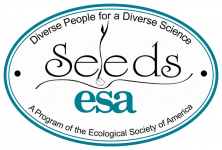Philosophy
“Teaching occurs when you change the way you do something, not so that it benefits you, but so that it enables a learner to master the process.”
My teaching philosophy is centered around four key objectives: (1) engage students in authentic scientific inquiry, (2) facilitate student-centered learning, (3) use writing as a tool for knowledge construction, and (4) foster diversity and inclusion within science. My primary goal is to help students master the process of learning by challenging them to think critically about what they know, what questions remain unanswered, and how they can solve these problems through scientific inquiry. Beyond that I aim to help students explore connections within biological systems so that they better understand the world we live in and the importance of science to society.
Teaching Experience
Since joining the SU faculty, I have taught introductory, advanced, and graduate courses that span topics in ecology, evolution, and general biology. My classes use a range of active and collaborative learning strategies that intentionally shift the focus from the teacher to the student in order to give students agency over their own learning while also engaging them in scientific inquiry and critical thinking.
Upcoming & Previous Courses:
Mentoring Philosophy & Experience
Mentoring student researchers is an important part of my role as an educator. Not only does independent research enhance a student’s educational experience, but it can also inspire passion for the natural world and encourage students to pursue careers in science. As a mentor, I engage student researchers in all parts of the scientific process from experimental design to manuscript preparation and participation at scientific meetings. Ultimately, I strive to create a positive research environment in which students can pursue their own academic interests while developing professional skills that will aid them in their future careers.
Over the course of my career, I have mentored over 36 undergraduate students (20 at Syracuse University) from diverse backgrounds and experiences. Many of these students successfully completed research theses, contributed to scientific publications, presented at research conferences, and ultimately went on to careers in science. For more information about their accomplishments, please visit our lab news feed and research pages.
If you are interested in ecological research, contact Dr. Katie Becklin and/or check out the research opportunities below.


